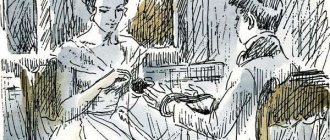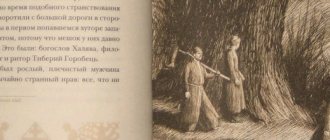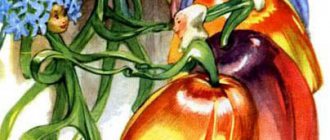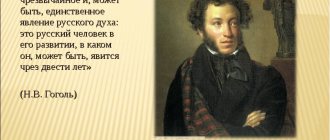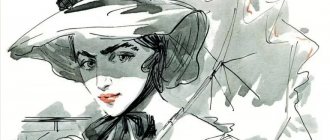The Tale of Frol Skobeev
There lived a poor nobleman Frol Skobeev in the Novgorod district. In the same district there was the estate of steward Nardin-Nashchokin. The steward’s daughter, Annushka, lived there. Frol decided to “have love” with Annushka. He met the steward of this estate and went to visit him. At this time, their mother came to them, who was always with Annushka. Frol gave his mother two rubles, but didn’t say why.
Continued after advertisement:
Christmas time arrived, and Annushka invited noble daughters from all over the area to her party. Her mother also came to Frol to invite his sister to the party. The sister, at Frol’s instigation, announced to the mother that she would come to the party with her girlfriend. When she began to get ready to visit, Frol asked her to give him a girl’s outfit too. The sister was scared, but did not dare to disobey her brother.
At the party, no one recognized Frol in his girl’s attire, not even the mother. Then Frol Skobeev gave his mother five rubles and confessed everything... She promised to help him.
The mother offered the girls a new game - wedding. Annushka was the bride, and Frol Skobeev (whom everyone took for the girl) was the groom. The “young” were taken to the bedroom. There, Frol Skobeev revealed himself to Annushka and deprived her of her innocence. Then the girls came in to them, but didn’t know anything. Annushka quietly reproached her mother, but she rejected all accusations, stated that she knew nothing about it, and even offered to kill Frol for such a “dirty thing.” But Annushka felt sorry for Frol. The next morning she released all the girls, and left Frol and her sister with her for three days. She gave him money, and Frol began to live much richer than before.
Briefly exists thanks to advertising:
Annushka's father, Nardin-Nashchokin, ordered his daughter to go to Moscow, because there were good suitors wooing her there. Having learned about Annushka’s departure, Frol Skobeev decided to follow her and marry the girl at all costs.
Frol stayed in Moscow not far from Nardin-Nashchokin’s courtyard. In church he met Annushka’s mother. The mother told the girl about the arrival of Frol Skobeev. Annushka was delighted and sent Frol money.
The steward had a nun sister. When her brother came to her monastery, the nun began to ask to be allowed to see her niece. Nardin-Nashchokin promised to let his daughter go to the monastery. The nun said that she would send a carriage for Annushka.
Getting ready to go on a visit, the father warned Annushka that a carriage from the nun sister could arrive at any time. Let, they say, Annushka get into the carriage and go to the monastery. Hearing about this, the girl immediately sent her mother to Frol Skobeev so that he could get a carriage somewhere and come to her.
Frol lived only by going about his business. Poverty did not allow him to have a carriage. But he came up with a plan. Frol went to the steward Lovchikov and asked for a carriage for a while “to view the bride.” Lovchikov complied with his request. Then Frol got the coachman drunk, dressed himself in a lackey's dress, sat on the box and went to Annushka. The mother, seeing Frol Skobeev, announced that they had come for Annushka from the monastery. The girl got ready and went to Frol Skobeev’s apartment. The father returned home and did not find his daughter, but was completely calm, knowing that she was in the monastery. Meanwhile, Frol married Annushka.
Continued after advertisement:
Frol brought the carriage with the drunken coachman to Lovchikov’s yard. Lovchikov tried to ask the coachman about where the carriage was and what happened, but the poor guy didn’t remember anything.
After some time, Nardin-Nashchokin went to the monastery to see his sister and asked her where Annushka was. The nun answered with surprise that she had not sent a carriage and had not seen her niece. The father began to grieve for his missing daughter. The next morning he went to the sovereign and reported what had happened. The Emperor ordered a search for the capital's daughter. He ordered Annushka’s kidnapper to show up. And if the thief does not show up himself, but is found, then he will be executed.
Then Frol Skobeev went to the steward Lovchikov, told about his action and asked for help. Lovchikov refused, but Frol threatened to accuse him of complicity: who gave the carriage? Lovchikov gave Frol advice: to throw himself at the feet of Nardin-Nashchokin in front of everyone. And he, Lovchikov, will stand up for Frol.
The next day, after mass in the Assumption Cathedral, all the attendants went out to Ivanovskaya Square to talk. Nardin-Nashchokin recalled the disappearance of his daughter. And at that time Skobeev came out in front of everyone and fell at the feet of Nardin-Nashchokin. The steward picked him up, and Frol announced to him his marriage to Annushka. The shocked steward began to threaten that he would complain about Frol to the king. But Lovchikov calmed Nardin-Nashchokin a little, and he went home.
At first the steward and his wife cried about the fate of their daughter, and then they sent a servant to find out how she was living. Having learned about this, Frol Skobeev ordered his young wife to pretend to be sick. Frol explained to the arriving servant that Annushka was sick from her father’s anger. The steward, having heard such news, felt sorry for his daughter and decided to at least bless her in absentia. He sent the young people an icon.
Briefly exists thanks to advertising:
The servant took the icon and took it to Frol. And before his arrival, Frol ordered Anna to sit down at the table. He explained to his father-in-law's servant that Annushka had recovered from her parents' blessing. The servant told the master everything. After this, the steward went to the tsar, reported that his daughter had been found, and asked to forgive Skobeev. The Emperor agreed.
Then Nardin-Nashchokin sent Skobeev all sorts of supplies, and he began to live richly. And after some time, the steward invited his son-in-law and daughter to his place. The parents at first scolded Annushka, but then they seated her and Frol at the table. Having mercy, Nardin-Nashchokin gave Frol two of his estates, and then gave him money.
A few years later the steward died. He made Frol Skobeev his heir. And Frol lived his life “in great glory and wealth.”
“The Tale of Frol Skobeev”: analysis of the work
“The Tale of Frol Skobeev (The Story of the Russian nobleman Frol Skobeev)” (probably arose in the 80s of the 17th century) goes beyond the circle of historical, hagiographical, demonological and moral-educational themes of the Middle Ages into the field of a light and entertaining story. Well-developed intrigue, humor, elements of psychologism and realistic everyday life, satirical tendencies are the distinctive features of this story. The language is unique, combining elements of the Slavic-Russian language and vernacular, folk-poetic and borrowed vocabulary (“register”, “persona”, “banquets”, etc.), clerical speech (“in the Novgorod district there was a nobleman Frol Skobeev”) of Moscow orders (this suggests the origin of the story in the bureaucratic environment). Thematically and stylistically, the story is close to oral everyday and satirical fairy tales, on the one hand, and to the picaresque short story, which entered the reading circle in the 17th century, on the other.
The main character is an active but unscrupulous person who always achieves his plans, and is depicted without the slightest shade of satire. The story tells how the “snitch,” the poor Novgorod nobleman Frol Skobeev, arranges his well-being through clever tricks. He tricks his way into the house of the wealthy steward Nardyn-Nashchekin, seduces his daughter Annushka and then takes her away from her parents' house. Having secretly married her, he uses rogue tricks to obtain forgiveness and recognition of this marriage from the steward. Will, perseverance, common sense, practicality in life - these are the positive qualities that Skobeev possesses, along with immorality and cynicism. The hero's actions are motivated not by the intervention of an outside force, but by free choice arising from the character and properties of his nature.
A.M. Panchenko, D.S. Likhachev called “The Tale of Frol Skobeev” one of the first Russian picaresque short stories. According to the laws of the genre, the short story does not know didactics and edification, does not condemn or justify anyone; the short story is built on the principle of an entertaining plot; there is no strict division of characters into good and evil. The hero of “The Tale of Frol Skobeev” is an ordinary, ordinary person, a rogue, and everyone else falls for his deceit; The style of the story is the style of business prose, lively, colloquial language).
The story attracted the attention of writers of the 18th and 19th centuries: in the 80s. XVIII century based on it N.I. Novikov wrote the story “Novgorod Girls’ Yuletide Evening”; N.K. Karamzin used the plot in the story “Natalya, the Boyar’s Daughter”; in the 60s XIX century appeared “The Comedy about the Russian nobleman Frol Skobeev” by playwright D.V. Averkiev, and in the mid-40s. XX century composer T.N. Khrennikov created the comic opera Frol Skobeev.
Source: Yurina N.G. History of Old Russian Literature. — M: FLINTA, 2015
Summary of The Tale of Frol Skobeev
The Tale of Frol Skobeev
There lived a poor nobleman Frol Skobeev in the Novgorod district. In the same district there was the estate of steward Nardin-Nashchokin. The steward’s daughter, Annushka, lived there.
Frol decided to “have love” with Annushka. He met the steward of this estate and went to visit him. At this time, their mother came to them, who was always with Annushka.
Frol gave his mother two rubles, but didn’t say why.
Christmas time arrived, and Annushka invited noble daughters from all over the area to her party. Her mother also came to Frol to invite his sister to the party. The sister, at Frol’s instigation, announced to the mother that she would come to the party with her girlfriend.
When she began to get ready to visit, Frol asked her to give him a girl’s outfit too. The sister was scared, but did not dare to disobey her brother.
At the party, no one recognized Frol in his girl’s attire, not even the mother. Then Frol Skobeev gave his mother five rubles and confessed everything... She promised to help him.
The mother offered the girls a new game - wedding. Annushka was the bride, and Frol Skobeev (whom everyone accepted
for the girl) - the groom. The “young” were taken to the bedroom. There, Frol Skobeev revealed himself to Annushka and deprived her of her innocence. Then the girls came to them, but did not know anything.
Annushka quietly reproached her mother, but she rejected all accusations, stated that she knew nothing about it, and even offered to kill Frol for such a “dirty thing.” But Annushka felt sorry for Frol. The next morning she released all the girls, and left Frol and her sister with her for three days.
She gave him money, and Frol began to live much richer than before.
Annushka's father, Nardin-Nashchokin, ordered his daughter to go to Moscow, because there were good suitors wooing her there. Having learned about Annushka’s departure, Frol Skobeev decided to follow her and marry the girl at all costs.
Frol stayed in Moscow not far from Nardin-Nashchokin’s yard. In church he met Annushka’s mother. The mother told the girl about the arrival of Frol Skobeev.
Annushka was delighted and sent Frol money.
The steward had a nun sister. When her brother came to her monastery, the nun began to ask to be allowed to see her niece. Nardin-Nashchokin promised to let his daughter go to the monastery.
The nun said that she would send a carriage for Annushka.
Getting ready to go on a visit, the father warned Annushka that a carriage from the nun sister could arrive at any time. Let, they say, Annushka get into the carriage and go to the monastery. Hearing about this, the girl immediately sent her mother to Frol Skobeev so that he could get a carriage somewhere and come to her.
Frol lived only by going about his business. Poverty did not allow him to have a carriage. But he came up with a plan. Frol went to the steward Lovchikov and asked for a carriage for a while “to view the bride.”
Lovchikov complied with his request. Then Frol got the coachman drunk, dressed himself in a lackey's dress, sat on the box and went to Annushka. The mother, seeing Frol Skobeev, announced that they had come for Annushka from the monastery.
The girl got ready and went to Frol Skobeev’s apartment. The father returned home and did not find his daughter, but was completely calm, knowing that she was in the monastery. Meanwhile, Frol married Annushka.
Frol brought the carriage with the drunken coachman to Lovchikov’s yard. Lovchikov tried to ask the coachman about where the carriage was and what happened, but the poor guy didn’t remember anything.
After some time, Nardin-Nashchokin went to the monastery to see his sister and asked her where Annushka was. The nun answered with surprise that she had not sent a carriage and had not seen her niece. The father began to grieve for his missing daughter. The next morning he went to the sovereign and reported what had happened.
The Emperor ordered a search for the capital's daughter. He ordered Annushka’s kidnapper to show up. And if the thief does not show up himself, but is found, then he will be executed.
Then Frol Skobeev went to the steward Lovchikov, told about his action and asked for help. Lovchikov refused, but Frol threatened to accuse him of complicity: who gave the carriage? Lovchikov gave Frol advice: to throw himself at the feet of Nardin-Nashchokin in front of everyone.
And he, Lovchikov, will stand up for Frol.
The next day, after mass in the Assumption Cathedral, all the attendants went out to Ivanovskaya Square to talk. Nardin-Nashchokin recalled the disappearance of his daughter. And at that time Skobeev came out in front of everyone and fell at the feet of Nardin-Nashchokin.
The steward picked him up, and Frol announced to him his marriage to Annushka. The shocked steward began to threaten that he would complain about Frol to the king. But Lovchikov calmed Nardin-Nashchokin a little, and he went home.
At first the steward and his wife cried about the fate of their daughter, and then they sent a servant to find out how she was living. Having learned about this, Frol Skobeev ordered his young wife to pretend to be sick. Frol explained to the arriving servant that Annushka was sick from her father’s anger.
The steward, having heard such news, felt sorry for his daughter and decided to at least bless her in absentia. He sent the young people an icon.
The servant took the icon and took it to Frol. And before his arrival, Frol ordered Anna to sit down at the table. He explained to his father-in-law's servant that Annushka had recovered from her parents' blessing. The servant told the master everything.
After this, the steward went to the tsar, reported that his daughter had been found, and asked to forgive Skobeev. The Emperor agreed.
Then Nardin-Nashchokin sent Skobeev all sorts of supplies, and he began to live richly. And after some time, the steward invited his son-in-law and daughter to his place. The parents at first scolded Annushka, but then they seated her and Frol at the table.
Having mercy, Nardin-Nashchokin gave Frol two of his estates, and then gave him money.
A few years later the steward died. He made Frol Skobeev his heir. And Frol lived his life “in great glory and wealth.”
